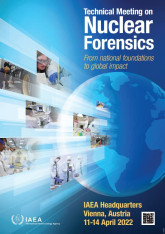Technical Meeting on Nuclear Forensics: From National Foundations to Global Impact
Introduction
The Technical Meeting on Nuclear Forensics will build on the outcomes of the prior IAEA Technical Meeting on Nuclear Forensics, which took place in April 2019. The meeting will address recent statements in the General Conference Resolutions supporting the development and widest possible implementation of nuclear forensics and radiological crime scene management among Member State partners. The meeting will include plenary sessions with key speakers, as well as parallel technical sessions on Nuclear Forensics Capability Building - Initiation and Sustainability, Nuclear Forensics Human Resource - Development and Sustainability, Nuclear Forensics Practices and Experiences, and Nuclear Forensic Science Research and Development - Current Status and Future Opportunities.
Objectives
The objective of the meeting is to focus on the application of nuclear forensics in response to incidents involving nuclear and other radioactive materials out of regulatory control, and to demonstrate links to radiological crime scene management, and support to potential judicial proceedings. Another important objective is to highlight States' experience in utilizing nuclear forensics for the prevention and response to criminal or intentional unauthorized acts involving nuclear or other radioactive material out of regulatory control.
Target Audience
Participants should comprise nuclear and forensic scientists, nuclear security event responders, law enforcement officials; prosecutors, nuclear regulators, nuclear security specialists and managers, those responsible for policies and plans for nuclear forensics and radiological crime scene management as well a as other subject matter experts involved in the conduct of a nuclear forensics examination and formulation of conclusions involving an investigation of a nuclear security event. Participants should have awareness and understanding of the role of nuclear forensics as a preventive and response measure to criminal or intentional unauthorized acts involving nuclear or other radioactive material out of regulatory control.
Working Language(s)
English
Structure
The Technical Meeting programme will consist of an opening session, plenary sessions, technical sessions, interactive poster presentations, interactive content sessions, side events, mini exercises and a closing session. The opening session will include welcoming addresses by representatives of the IAEA and cooperating organizations. The plenary sessions will continue with a combination of invited keynote presentations and contributed presentations addressing the main themes of the meeting. Each technical session will include selected presentations and/or pane discussions delivered by invited experts and participants and based on the extended abstracts submitted. The meeting will also include poster and interactive content sessions, with sufficient time for face-to-face discussions and interaction with colleagues. The final plenary session will be dedicated to technical and scientific findings and investigative conclusions that inform future IAEA planning.
The agenda will be structured with a balance of invited Member States' presentations, panel discussions and poster presentations.
Recognising the importance of international collaboration in nuclear forensics, the IAEA cooperates with nuclear forensic partners, including the Nuclear Forensics International Working Group (ITWG), the Global Initiative to Combat Nuclear Terrorism (GICNT) and the International Police Organisation (INTERPOL), all of which are expected to take part in the meeting. Exhibition areas will be available for the organizations above and the IAEA's partner institutes.
Topics
Consistent with the objectives set out above, the themes for the Technical Meeting are:
- Nuclear Forensics Capacity Building
- Lessons Learned and New Virtual Initiatives for Nuclear Forensics Capacity Building considering the pandemic
- New Technologies, R&D and Signature Research in Nuclear Forensics
- Newcomers in Nuclear Forensics: Minimum Technical and Scientific Required Capabilities
- Case Studies on Nuclear Forensics Capacity Building in Member States
- Nuclear Forensics as a National Responsibility
- Integration of Nuclear Forensics in a National Response Framework
- Good Practices in Establishing a Nuclear Forensics Legal Framework
- Application of Self-Assessment Tools for Assessing a National Nuclear Forensics Capability
- Benefits and Considerations in Establishing a National Nuclear Forensics Library
- Nuclear Forensics Sustainability and Cooperation
- Virtual Partnerships: Building and Maintaining National and International Relationships
- Human Resource Development in Nuclear Forensics
- Sustaining a National Nuclear Forensics Capability: Challenges and Considerations
- Inter-laboratory Exercises and International Cooperation on Nuclear Forensics
- The Intertwined Nature of Nuclear Forensics and Radiological Crime Scene Management
- Development of Emerging Technologies in Radiological Crime Scene Management
- Uses and Applications of Virtual Training for Radiological Crime Scene Management
- Novel Approaches to Categorization for Radiological Crime Scene Management
- Case Studies for Radiological Crime Scene Management
Individual plenary sessions will be arranged consistent with the four themes. In addition, an opening session will emphasize the role of nuclear forensics in the context of requirements from investigating authorities. The structure of the meeting programme will reflect the content of the extended abstracts received and accepted.
Venue
The event will be held at the Vienna International Centre (VIC) where the IAEA’s Headquarters are located. Participants must make their own travel and accommodation arrangements.
General information on the VIC and other practical details, such as a list of hotels offering a reduced rate for IAEA participants, are listed here.
Participants are advised to arrive at Checkpoint 1/Gate 1 of the VIC one hour before the start of the event on the first day in order to allow for timely registration. Participants will need to present an official photo identification document in order to be admitted to the VIC premises.
Visas
Participants who require a visa to enter Austria should submit the necessary application to the nearest diplomatic or consular representative of Austria at least four weeks before they travel to Austria. Since Austria is a Schengen State, persons requiring a visa will have to apply for a Schengen visa. In States where Austria has no diplomatic mission, visas can be obtained from the consular authority of a Schengen Partner State representing Austria in the country in question.



